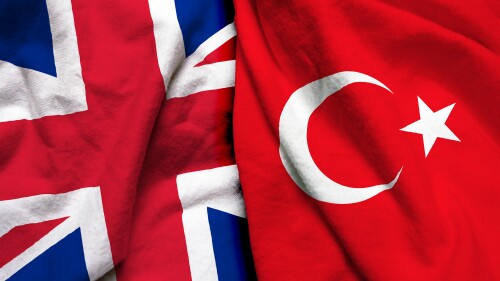On February 10 and 11, 2025, Greek Prime Minister Kyriakos Mitsotakis led a delegation to Paris for the Artificial Intelligence Action Summit. High on their agenda was France’s looming sale of its advanced Meteor air-to-air missiles to Turkey. France declined Greece’s request to block the sale. Turkey plans to equip its Eurofighter Typhoon jets with the missiles. Greece believes the missiles could change the regional balance of power; at worst, Athens worries that Ankara could use the missiles against it as Turkish President Recep Tayyip Erdoğan challenges Greek territory in the Aegean and Greece’s Exclusive Economic Zone.
France’s refusal to halt this sale undermines the security of Greece, Cyprus, and Israel. For decades, Turkey has challenged Greek sovereignty. Repeated Turkish violation of Greek airspace prompted Greece in 2021 to bolster its air defenses by purchasing 18 French-made Rafale fighter jets, followed by an additional six in 2022. The Hellenic Air Force deployed these aircraft, armed with MICA-IR and Meteor missiles, on Quick Reaction Alert (QRA) missions from Tanagra, near Athens. Their deployment reduced violation of the Greek airspace by the Turkish Air Force, from 2,286 incidents in 2022 to 334 in 2023 and 301 in 2024.
To undermine Greece’s qualitative military edge, Turkey has sought to acquire 40 Typhoon jets, which require Meteor missiles for full operational capability.
Turkey’s F-16 jets are less capable than the Rafales. To undermine Greece’s qualitative military edge, Turkey has sought to acquire 40 Typhoon jets, which require Meteor missiles for full operational capability. While other Typhoon-producing countries have agreed to sell, Turkey required France’s approval for the missile deal. With its approval, France enables Turkey to enhance its military capabilities against Greece. Athens sees this as a betrayal, both because of its long-standing strategic partnership with Paris and because Greece understood that its purchase of French Rafales would be exclusive. Greece and France have been allies for over five decades, with Greece consistently purchasing advanced French military hardware, from the Mirage F1C in 1975 and Mirage 2000s between 1975 and 2000 to the Rafale jets today. French aircraft have been instrumental to secure Greece’s airspace against Turkish threats. France’s approval of the sale of Meteor missiles to Turkey undermines this trust.
The sale also threatens Israel, whose air superiority in the region the Meteor missiles undermine. The Meteors, when launched from Typhoons, have a range of 120 miles. Israel’s fighter jets, such as the F-15A/C Baaz and newer F-15I Ra’ams, rely on the AIM-120C advanced medium-range air-to-air missiles with a maximum range of 75 miles for Beyond Visual Range air combat. However, the Meteor’s range and performance would give Turkish Typhoons an advantage, especially in a potential confrontation over Syria. This is not the first time France has prioritized economic interests above its allies’ security. In the 1970s and 1980s, France assisted Iraqi President Saddam Hussein’s nuclear ambitions.
The United States can counter Turkey’s decision by beating France at its own game. The France-based MBDA consortium produces the Meteor missiles that the French government hopes to sell to Turkey. Its ambitions to sell Meteors to the United Kingdom, Italy, and other partners of the Joint Strike Fighter program for use on F-35s provides the United States with leverage: If MBDA proceeds with its sale, it will lose far bigger clients. For Washington, preventing Ankara from acquiring these missiles would limit Turkey’s ability to challenge Greece and Israel in the air, ensuring regional stability and security.







